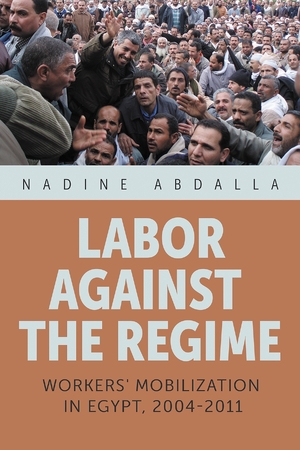"This work constitutes a major contribution to our understanding of labor and labor protests in the run up to the 2011 Egyptian Revolution. It is also likely to be the single best English-language account of the two critical contentious labor episodes that precede the revolution."—Ian M. Hartshorn, author of Labor Politics in North Africa: After the Uprisings in Egypt and Tunisia
"Abdalla has written a fascinating and sophisticated analysis of two Egyptian labor movements during the years before the uprising of 2011. She persuasively emphasizes the crucial role of labor leaders' strategic choices and of the strategic interactions between these leaders and the Mubarak regime."—Jeff Goodwin, New York University
"Although recent theories of revolutionary moments have concentrated on their political dimension, Nadine Abdalla brilliantly rebalances attention through a smashing pair of case studies of trade unions, which have unique capacities in their social networks and economic centrality. Perhaps the best application yet of the strategic-interactionist theoretical paradigm, highlighting leaders’ strategic decisions."—James M. Jasper, author of The Art of Moral Protest
"Abdalla pushes the boundaries of social movement theory to develop a compelling argument about the centrality of leadership in building and sustaining an effective labor movement in Egypt during the final years of the Mubarak era. Her work is an important contribution. It deserves to be widely read."—Steven Heydemann, author of Networks of Privilege in the Middle East
"A brilliantly written landmark in the study of labor activism and Egyptian politics under Mubarak. Nadine Abdallas’ important study about the formative years of independent unionism in Egypt is rooted in impressive long-term fieldwork offering unique insights into a highly dynamic and diverse movement."—Cilja Harders, coeditor of The Affective Dynamics of Mass Protest
"Essential in shedding light on the importance of agency and leadership in social movements operating in authoritarian contexts."—Nadine Sika, author of Youth Activism and Contentious Politics in Egypt
Description
How do worker movements emerge and evolve under authoritarian regimes? What enables labor activists to overcome constraints and win concessions, and what leads to demobilization? Nadine Abdalla provides an inside look at two of Egypt’s most significant worker protest movements in the years preceding the 2011 Arab uprisings.
Through a fine-grained analysis of the labor movement at the Misr Spinning and Weaving Company in Al-Mahalla Al-Kubra and the State Employees Movement of the Real Estate Tax Collectors, Labor Against the Regime reveals the pivotal role played by activist leaders in shaping a movement’s trajectory. Drawing on extensive fieldwork, interviews, and primary sources, Abdalla traces how these movements overcame daunting odds to first take shape, achieve socio-economic demands, and ultimately challenge the Mubarak regime’s corporatist control over labor relations. The book explores how activist leaders’ personal backgrounds, careers, and embeddedness within movements conditioned their choices—ultimately steering protests down different pathways of contestation and institutionalization. As one of the first book-length studies to comparatively analyze Egypt’s labor activism before and after the Arab Spring, Labor Against the Regime provides vital insights into the changing relationship between workers, social movements, and the pre-uprising political order.
About the Author
Nadine Abdalla is assistant professor of sociology at the American University in Cairo.
February 2025




